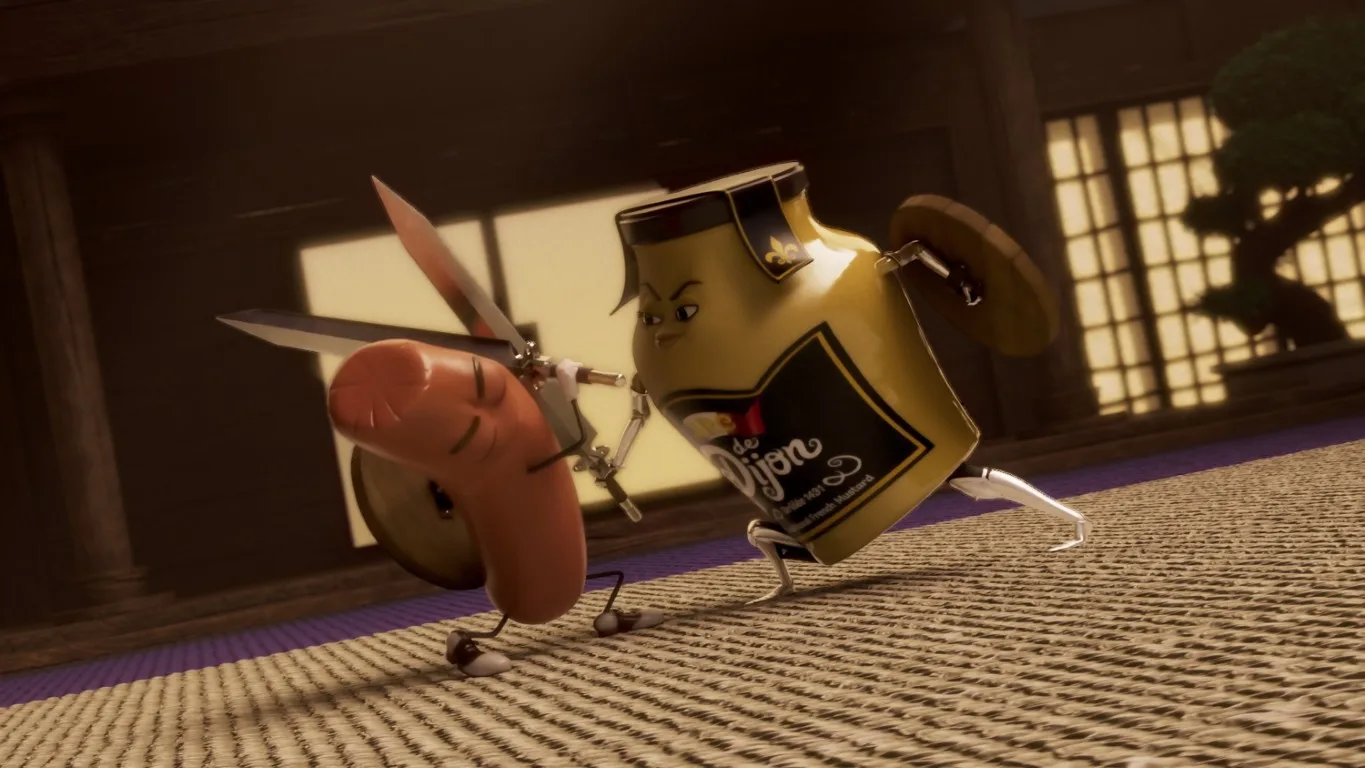The sentient, foul-mouthed food from Prime Video’s “Sausage Party: Foodtopia” returns this week for a second serving of animated ferocity. The 2024 freshman season never quite justified its existence, as it meandered through an exhausting, politically charged plot. However, the show did reach an intriguing cliffhanger as Frank (Seth Rogen) ascended to the position of totalitarian leader of Foodtopia with his human Jack (Will Forte) as his enforcer. To everyone’s surprise, the showrunners of “Foodtopia” reroute Frank and the gang in a surprisingly superior second season, elevating everything to the highest part of the fridge.
Season two opens with a catchy and sex-joke-filled musical number that imagines Frank’s vision of Foodtopia flourishing as a bustling paradise. But he’s quickly reminded that’s far from reality once he wakes up from his nightmare: Foodtopia has gone sour since his hostile takeover. Frank, who is grieving over the death of his Bun love Brenda, uses his grief to control Jack, and his friends Barry (Michael Cera) and Sammy Bagel Jr. (Edward Norton). The Foodtopia denizens decide that they’ve had enough of the power-hungry sausage, and a few of them plan an assassination attempt. Sammy and Barry sabotage the scheme and attempt to negotiate a fair penalty: banishment. In turn, Frank is exiled, along with his buddies. With nowhere to go and not much bath salts to have Jack communicate with them, the crew are at their wits’ end. After abandoning Jack along their journey, they stumble upon Newfoodland, an advanced utopia where people and food live together in harmony.
Upon their arrival, the outcasts are celebrated for their initial food revolution and instantly integrated into this new community. Frank becomes part of a United Nations-like council headed by a walnut named Trish (Jillian Bell); Barry is sent to join their action squadron and falls in love with Dijon (Marion Cotillard), a warrior mustard; Sammy discovers filmmaking and becomes a director. Jack, who eventually arrives in Newfoodland, joins the human-jaeger program and develops a romantic interest in Jill (Patti Harrison). Soon, Frank and Barry learn that the council uses their jaeger-like human devices to consume food in other communities as a means of power plays or “fuel missions,” and their idea of paradise is called into question. When Foodtopia is next on their map, they must rally to save the town that was once out to kill him.
In contrast to the ill-conceived political allegory of the first season, season two cleverly realizes its sci-fi post-apocalyptic potential, cleverly expanding on the worldbuilding of a food-dominated world. Largely due to its technologically advanced environment, the Foodtopia-based characters have become fish out of water. To further illustrate this, the eight-episode season demonstrates how devolved they are in comparison to their Newfoodland counterparts, as Frank is illiterate and Barry’s style of piloting humans is more “Ratatouille”-like primitive than their “Pacific Rim”-like methods. Every drawback of its predecessor—pacing, characterization, gags, and scope—is significantly improved as a result of Newfoodland, making it genuinely entertaining to see how many fresh elements the writers and returning series director Conrad Vernon serve up, rather than just repeating what was stale last time around.

Many of the voice actors, old and new, deliver solid performances. Still, Cera—well into his “Ceraissance” with raves for work like “The Phoenician Scheme”—surpasses the bunch through charismatic and comically strong line readings that produce laughs every single episode. However, there’s a gaping hole in the absence of Kristen Wiig. Brenda’s death in season one was a shocking misstep, turning “Sausage Party,” for lack of better words, into a sausage party. The season attempts to rectify this by including as many supporting female characters as possible. Nevertheless, Dijon and Jill, who primarily function as love interests to Barry and Jack, are nowhere near as dimensional or hold the same weight as Brenda.
Most of all, the season has a confident sense of humor that was lacking in its freshman outing. Morality is the theme that’s dished this turn, particularly from the concept of food weaponizing humans to assert dominance. They mine major substance from the messed-up premise regarding food revolution pioneers encountering food colonialism. What moral changes does it induce in them and one another when they are at odds? You’ll almost forget you’re watching talking sausages. Almost.
Whole series screened for review. Second season starts today on Prime Video.
